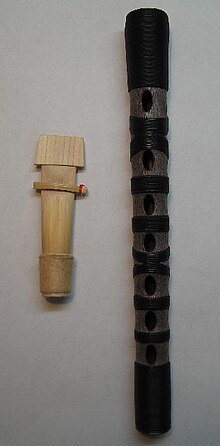Hichiriki

The hichiriki (Japanese: 篳篥) is a double reed instrument used as one of two main melodic instruments in Japanese gagaku music, the other being the ryuteki. The hichiriki is difficult to play, due in part to its double-reed configuration. Although a double reed instrument like the oboe, the hichiriki has a cylindrical bore and thus its sound is similar to that of a clarinet. Pitch and ornamentation (most notably bending tones) is controlled largely with the embouchure. The hichiriki is one of the "sacred" instruments and is often heard being played at Shinto weddings in Japan. It produces a sound that many describe as "haunting."
The hichiriki is the most widely used of all instruments in Gagaku and it is used in all forms of music aside from poetry recitation.
The hichiriki is derived from the Chinese guan or bili, and is also related to the Korean piri.
